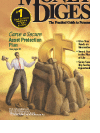Are You Managing a Business or a Hobby?
Research Recommendations
Are you a physician-investorwho operates a side business?Did you know the IRS couldconsider it a hobby? Generally, theIRS views a sideline business thatinvolves recreation or other elementsof personal pleasure as a hobby andmay challenge any losses you claimfrom the activity, according to a recentreport in (800-543-2055;www.nibm.net).
The courts typically apply 9 factors,which are taken from the taxregulations, to determine whether aparticular activity is a business or ahobby (IRC Reg. 1.183-2(b)). Physicianswith side businesses shouldhave a clear understanding of whichactivities constitute a business andwhich activities don't. The followingcase illustrates how the US Tax Courtdetermines the difference betweenbusiness and pleasure.
BUSINESS vs HOBBY
Robert Schwartz, MD, a NewYork gynecologist, and his wife,Diane, had successfully bought andsold sailboats for over 25 years.Their yachting business (DianeRacing International) was incorporatedas an S corporation, and Mrs.Schwartz was in charge of handlingthe corporation's books.
An S corporation is a businessthat has elected a special tax statuswith the IRS that allows the corporationnot to be a separately taxableentity. Instead, the income is treatedlike the income of a partnership orsole proprietorship; therefore, theshareholder's individual tax returnsreport the income or loss generatedby the S corporation.
Dr. Schwartz had purchased a50-foot racing boat for $350,000.Based on advice from his attorney,he didn't transfer ownership of theboat to the corporation. When theboating operation ended up showinga considerable loss, Dr. Schwartzdeducted the loss as a businessexpense. The IRS challenged thededuction, claiming that he had ahobby and not a business. Dr.Schwartz objected, and the case wasbrought before the Tax Court.
DR. SCHWARTZ vs THE IRS
The Tax Court examined the following9 factors before rendering adecision to Dr. Schwartz:
• Manner in which the activitywas carried on. The fact that ataxpayer carries on the activity in abusinesslike manner and maintainscomplete and accurate books andrecords may indicate a profit objective.A change of operating methods,adoption of new techniques, orabandonment of unprofitable methodsin a manner consistent with theintent to improve profitability mayalso indicate a profit motive.
• Taxpayer's expertise. A taxpayer'sexpertise, research, and investigationof an activity, as well astheir consultation with experts inthe field, may indicate profit intent.
• Time and effort spent onthe activity. The fact that the taxpayerdevotes much of their personaltime and effort to carrying on anactivity may indicate an intention toderive profit.
• Taxpayer's asset expectation.Did the taxpayer expect thatassets used in the activity wouldeventually appreciate in value?
• Taxpayer's success in similaractivities. A taxpayer's successin other business activities may indicatea profit objective.
• Taxpayer's history of incomeor loss. A record of substantiallosses over several years may beindicative of the absence of a profitmotive. Section 1.183-2(b)(6), IncomeTax Regs, however, providesthat if losses are sustained becauseof unforeseen or fortuitous circumstancesthat are beyond the controlof the taxpayer, such losses wouldnot be an indication that the activityis not engaged in for profit.
• Amount of occasional profits,if any, from the activity. Anopportunity to earn a substantialultimate profit in a highly speculativeventure is ordinarily sufficientto indicate that the activity isengaged in for profit, even thoughlosses or only occasional small profitsare actually generated.
• Financial status of the taxpayer.A taxpayer's financial statusmay indicate a profit motive. If ataxpayer is struggling financially,they are unlikely to get involved inan activity that would result in largelosses at that point.
• Elements of personal pleasureor recreation. The absenceof personal pleasure or recreationrelating to the activity in questionmay indicate the presence of a profitobjective. The fact that a taxpayerderives pleasure from a particularactivity does not demonstrate a lackof profit motive.
In the end, the Tax Court sidedwith Dr. Schwartz, ruling that hisfinancial status indicated that heintended to show a profit. Dr.Schwartz could not afford to sustainlarge losses, the court said, for 3reasons: He underwent bypasssurgery, which forced him to take aleave of absence from his medicalpractice; he has 3 children in graduateschool; and he recently experienceda huge decline in his pensionplan.
